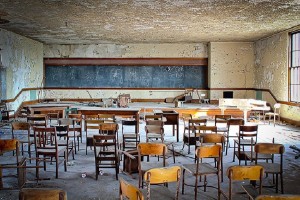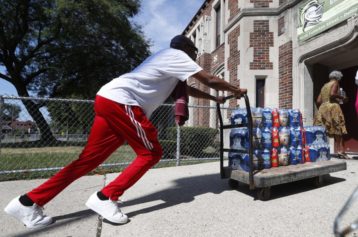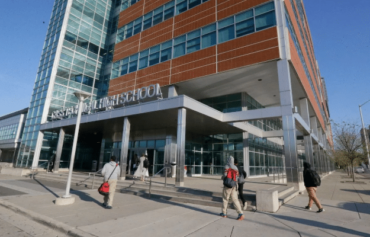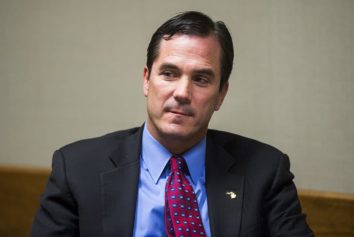
An abandoned Detroit school. (Photo: Thomas Hawk/Flickr)
What’s going on with Detroit schools? As Flint endures an environmental catastrophe with its water crisis, the Motor City’s school system is suffering from a financial crisis and will not be able to make payroll after April 8.
According to the newly appointed emergency manager, Steven Rhodes, if state lawmakers do not act soon and pass legislation to deal with the debt the school district has accumulated, they will be unable to write checks, according to the Washington Post. Rhodes, along with new Superintendent Alycia Meriweather, spoke before members of the state House Appropriations Committee.
The Michigan legislature is considering laws to address the debt, overhaul the schools and return them to local control. The school system, which has been under state control since 2009, has $515 million operating debt and total debt over $3 billion, and cannot afford to take on additional loans. Teachers have held sickouts and filed lawsuits to highlight the problems of black mold, vermin, mushrooms, freezing and boiling-hot classrooms, and crumbling school buildings, all in an environment where students are supposed to learn.
“We can pay employees for the work they do through April 8, but not after that. … I cannot, in good conscience, ask teachers to work after April 8 knowing that I can’t pay them when their paychecks are due two weeks later,” Rhodes said, as the Detroit Free Press reported. “There is no plan B because we can’t print money,” he added, while noting it would be unacceptable for Detroit Public Schools to “go dark” after April 8.
Rick Snyder, the conservative Republican governor, has come under fire for his emergency-management scheme, in which he has thwarted the democratic will of locals by taking over municipalities and running their operations through an appointed manager. Given the control exerted by the managers — and mismanagement, resulting in one crisis after another, typically in predominantly Black cities — the system smacks of colonialism. The former emergency manager who recently left the Detroit schools, Darnell Earley, previously served as the emergency manager of Flint. Apparently this is what state control looks like, with mismanagement, austerity and callousness when communities of color are in the mix, as predominantly Black cities in Michigan are treated like African nations indebted to the World Bank and the IMF — crippled and impoverished in the process.
Mushrooms in a classroom. #SupportDPSTeachers pic.twitter.com/97FZ53fxxe
— Detroitteach (@teachDetroit) January 12, 2016
No empowered school board. No justice. No peace. This is what you eat for breakfast. Moldy bread thing. pic.twitter.com/SWwVouIkqr
— Detroitteach (@teachDetroit) January 16, 2016
Just some paint chips. #supportDPSteachers pic.twitter.com/iwxRMuaJDz
— Detroitteach (@teachDetroit) January 15, 2016
Apparently children with disabilities don’t need toilet seats. #supportDPSteachers @PedroniTom @DreaMcCoy pic.twitter.com/SMuCD8peNe
— Detroitteach (@teachDetroit) January 13, 2016
As the Post reported, Detroit students are falling behind, with only 6 percent of fourth graders scoring proficient or better in reading, and students performing well below state and national standards. Although testing is not everything, when taken in combination with the deteriorating conditions in which these children are “learning,” a sad picture of educational neglect and malpractice comes into full view. To make things even worse, many Detroit children live in poverty, and if the schools close, they will no longer receive free breakfast or lunch.
“If Detroit Public Schools runs out of money on April 8, the stark reality is that Detroit’s students won’t have schools to attend, many students won’t receive breakfast or lunch, and educators and school staff won’t get paid. These are the real consequences of Lansing inaction,” said a joint statement from three unions — the Detroit Federation of Teachers Interim President Ivy Bailey; Detroit Association of Educational Office Employees President Ruby Newbold; and Detroit Federation of Paraprofessionals President Donna Jackson.
“We now have a date and a real urgency to get serious about making sure our schools are adequately funded. Our members won’t work for free, and our students deserve to have a public school system that works for them — not for Lansing politicians.”
Teachers are concerned that the mounting debt — at $1,100 per pupil — compromises their ability to teach children. Further, enrollment is falling and teaching positions have not been filled.
“A teachers’ strike now is the only way to save public education in Detroit. With a strike, Rhodes and Lansing will find the money to pay us — and quickly,” said Steve Conn, ousted DFT president, according to the Detroit News.
There is $715 million legislation pending in the state Senate that would split the Detroit schools into two entities, one to deal with the debt, and the other a debt-free district to teach students, as the Free Press reported. Further, a new school board would consist of appointees of Detroit Mayor Mike Duggan and Governor Snyder, and would become fully elected later this year. However, under a more controversial package in the Michigan state House, the district would also be bifurcated, but collective bargaining would be restricted for teachers, and a fully elected school board would not be restored for eight years.


